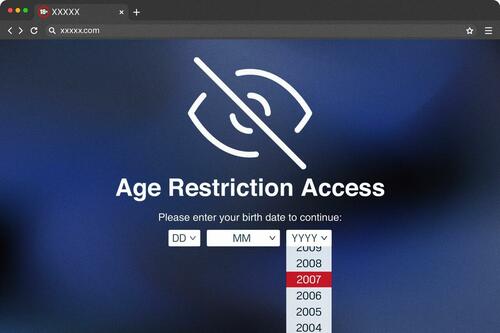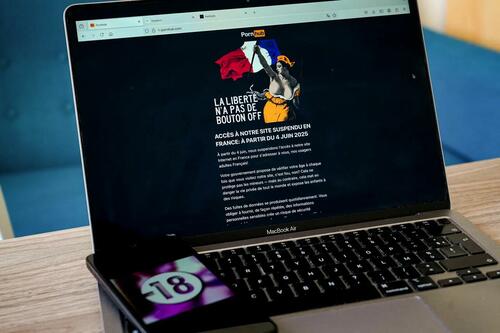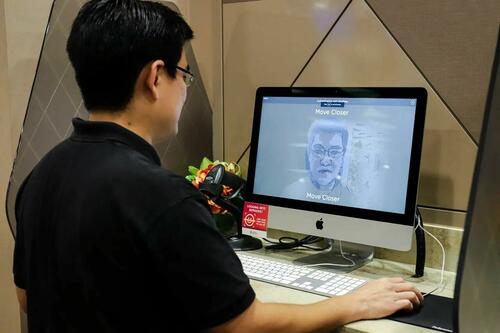
Эпоха онлайн-проверок возраста — как это работает?
Автор: Оуэн Эванс, The Epoch Times (выделено нами),
Законы, требующие от интернет-пользователей подтверждения возраста, распространяются по всему миру.
В Соединенных Штатах, по крайней мере, 24 штата уже приняли законы, требующие, чтобы порносайты проверяли возраст пользователей.
 Изображение: The Epoch Times, Shutterstock
Изображение: The Epoch Times, ShutterstockНесколько стран, включая Германию, Францию, Австралию и Ирландию, внедрили проверку возраста для доступа к определенному контенту.
В конце июля Великобритания запустила самую полную национальную систему.
Как на практике работает проверка возраста? Что такое лазейки? Как это может изменить Интернет? Вот что говорят эксперты.
Как проверка возраста работает на практике
Системы возрастной проверки варьируются от загрузки фотографии идентификации, такой как водительское удостоверение, до продвинутого биометрического сканирования.
Ассоциация поставщиков услуг по проверке возраста перечисляет несколько утвержденных методов проверки возраста, включая проверку учетной записи мобильного телефона, сопоставление кредитных баз данных, транзакционные записи и приложения для цифровых идентификаторов.
Некоторые платформы просят пользователей загрузить идентификатор, выданный правительством, в то время как другие полагаются на данные учетной записи мобильного телефона, банковские или кредитные записи или приложения для цифровых идентификаторов, чтобы подтвердить возраст.
Все чаще сайты обращаются к биометрическим решениям, таким как анализ лица, который оценивает возраст от селфи или краткой проверки движения.
Например, Reddit использует сторонний сервис Persona для проверки идентификатора или живого селфи, в то время как Discord полагается на k-ID, который подтверждает возраст, анализируя движения лица. X объединяет сигналы внутренней учетной записи с дополнительными проверками личности.
Порносайты, такие как Pornhub, предлагают множество вариантов, таких как требование удостоверения личности с фотографией или проверка кредитной карты, прежде чем пользователи смогут просматривать материалы сексуального характера.
Следующие 24 месяца
Мэри Энн Миллер (Mary Ann Miller), вице-президент и консультант по мошенничеству в Prove, платформе цифровой идентификации, заявила, что проверка возраста станет более стандартной и необходимой в течение следующих 24 месяцев.
Миллер сказал, что более простые методы включают загрузку удостоверения личности, выданного правительством, которое иногда проверяется на подлинность или селфи, сделанное для обеспечения точности идентификации, и что человек жив.
«Другие методы используют решения, которые используют технологию, которая использует телефон в качестве прокси-сервера для нашей идентичности, поскольку мы постоянно держим их с нами и определяем уверенность и доверие человека, представляющего информацию или подтверждающего свой возраст или возраст ребенка в рамках родительского согласия», — сказала она.
 Домашняя страница Pornhub отображает уведомление о приостановлении во Франции из-за требований проверки возраста, в Валансе, Франция, 4 июня 2025 года. Страны по всему миру, включая десятки штатов США, внедрили проверки возраста для доступа к определенным веб-сайтам и платформам социальных сетей. Николас Гайоннет/Ханс Лукас/AFP через Getty Images
Домашняя страница Pornhub отображает уведомление о приостановлении во Франции из-за требований проверки возраста, в Валансе, Франция, 4 июня 2025 года. Страны по всему миру, включая десятки штатов США, внедрили проверки возраста для доступа к определенным веб-сайтам и платформам социальных сетей. Николас Гайоннет/Ханс Лукас/AFP через Getty Images"Другие методы включают оценку возраста на основе распознавания лиц или других источников данных. "
С точки зрения того, какие методы являются наиболее надежными, Миллер указал на те, которые "могут сначала использовать пассивные методы для определения удостоверения личности, а затем проверки возраста в рамках потока идентификации. "
Методы пассивного удостоверения личности проверяют личность пользователя, не требуя от пользователя активных действий, таких как ввод пароля или сканирование отпечатка пальца, используя данные, уже доступные для определения возраста, включая кредитные карты, IP-адреса или другую информацию.
Предприятиям в ближайшем будущем придется пересмотреть свои системы проверки возраста, чтобы соответствовать более строгим стандартам, а не полагаться на низкоточные или лоскутные проверки личности.
"Что застало многие компании врасплох, так это то, что когда они пытаются применить проверку возраста с низкой точностью проверки личности или отсутствием проверок личности, они должны вернуться к чертежной доске. ? По обоим аспектам, - сказала она.
Толчок для биометрической проверки
Биометрическую оценку возраста можно проводить с помощью анализа лица.
Другие методы включают голосовые чертежи, жесты и нажатия клавиш (как вы вводите). Эти методы в настоящее время менее развиты, чем анализ лица, но быстро прогрессируют.
Дерек Джексон, главный операционный директор и соучредитель Cyber Dive, технологической компании, основанной с миссией обеспечения безопасности детей в Интернете, сказал The Epoch Times по электронной почте, что биометрия лица «новее, но быстро набирает обороты». "
«Они оценивают ваш возраст, анализируя черты лица, скулы, расстояние между глазами, тон кожи в режиме реального времени», — сказал Джексон. «Голосовая биометрия и схемы нажатия клавиш еще новее». Они пытаются сопоставить ваши уникальные паттерны, ваш голос, то, как быстро или медленно вы вводите известные возрастные профили. "
Он сказал, что распознавание лиц быстро растет, потому что «это просто, быстро и удивительно эффективно». "
 Сотрудник GovTech демонстрирует проверку лица для доступа к государственным услугам в общественном центре в Сингапуре 1 октября 2020 года. По мере расширения правил проверки возраста некоторые сайты используют биометрические инструменты, такие как анализ возраста на основе селфи, в дополнение к выданным правительством идентификаторам, банковским или кредитным записям или приложениям для цифровых идентификаторов. Мартин Аббугао / АФП через Getty Images
Сотрудник GovTech демонстрирует проверку лица для доступа к государственным услугам в общественном центре в Сингапуре 1 октября 2020 года. По мере расширения правил проверки возраста некоторые сайты используют биометрические инструменты, такие как анализ возраста на основе селфи, в дополнение к выданным правительством идентификаторам, банковским или кредитным записям или приложениям для цифровых идентификаторов. Мартин Аббугао / АФП через Getty ImagesРиски конфиденциальности и скептицизм
Пользователи по-прежнему настороженно относятся к обмену личными данными в Интернете, особенно государственными идентификаторами или биометрическими данными.
Денис Вязовой, директор по продуктам AdGuard VPN, сказал, что некоторые платформы пытаются быть более осведомленными о конфиденциальности, например, не постоянно хранить селфи или документы, удостоверяющие личность, или хранить данные всего семь дней.
"Но даже при таких заверениях доверие низкое,Об этом он сообщил The Epoch Times по электронной почте.
«Несмотря на то, что платформы утверждают, что данные о лицах или сканирование личности не хранятся в течение длительного времени, люди по-прежнему настороженно относятся к этому, и это справедливо. Правда в том, что любой метод, требующий биометрических данных, правительственного удостоверения личности или конфиденциальной финансовой информации, создает серьезные риски для конфиденциальности. "
Новый закон Великобритании
Безопасность онлайн в Великобритании Закон не предусматривает единого метода проверки возраста. Технический регулятор Великобритании Ofcom, который отвечает за соблюдение закона, просто требует от компаний внедрять высокоэффективные гарантии возраста.
Закон направлен на удержание лиц моложе 18 лет вне помещений для взрослых, но не говорит компаниям, как достичь этой цели, оставляя фирмы выбирать свои собственные системы проверки, пока они «очень эффективны». "
Но неспособность внедрить систему может привести к финансовым штрафам в размере до 10 процентов от мирового дохода службы или 18 миллионов фунтов стерлингов (23,9 миллиона долларов США), в зависимости от того, что больше. Закон об онлайн-безопасности является законом Великобритании, но он затрагивает американские и глобальные компании, не имеющие юридического присутствия в стране.
Читайте остальное здесь...
Тайлер Дерден
Сат, 08/09/2025 - 08:10








